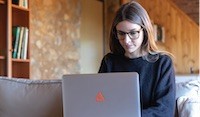Edinburgh Science team is pleased to reveal Elements of #EdSciFest, an ambitious free online programme of science videos, Facebook Lives, blogs, downloadable activities, Q&As, online challenges and more to keep sci-curious minds busy at home.
Being the world’s first and still Europe’s largest science festival, Edinburgh Science Festival has a wealth of experience in creating fun, engaging science content. Elements of #EdSciFest is set to be a fantastic resource for people of all ages confined to their homes and with many parents trying their hand at home-schooling.
Drawing on the Elementary theme of the Edinburgh Science Festival 2020, this wide-ranging project is a digital reiteration of the Festival which had to be cancelled in light of the Covid-19 pandemic.
In the face of these unprecedented challenges, the Festival has called on its speakers and partner organisations to put together an exciting and innovative digital programme.
The content of the Elements of #EdSciFest programme explores science’s role in addressing the biggest global environmental challenges through five strands – Air, Earth, Fire, Water and Aether, the latter representing the digital world.
Each element provides a different way of looking at some of the challenges and opportunities facing humanity. The All Fired Up strand focuses on how we tackle the climate crisis with the urgency it requires. One Earth explores the circular and sharing economies, tackles our extinction crisis and looks at ways we can feed the world on a global scale. The Air We Breathe looks into air pollution and fuel alternatives that will help bring clean air to as many people as possible. Water for Life dives into our relationship with rivers and oceans and the protection they need from exploitation. Finally, Aether / Go Digital looks at the power we hold at our fingertips, the potential solutions that technology holds to our problems and the issues that might arise from it.

The Festival’s outdoor photography exhibition, Into the Blue, is now being brought indoors and on to our screens for everyone to enjoy from home. Every day the Festival is uploading a new picture from the exhibition on to their Instagram, taking users on a fascinating journey around some of Scotland’s most remarkable coastlines with stunning photography from local artists.
Online content will include a series of short science videos covering a huge range of topics. These have been filmed by speakers who were originally planned to appear at the Science Festival, along with some special new additions who were keen to get involved following the cancellation announcement.
Live-streamed content will include talks from broadcaster Claudia Hammond on the importance of rest in our fast-moving world, science writer Marcus Chown on the vast complexities of the Universe and Professor Ilan Kelman on how the majority of natural disasters are created or exacerbated by human choices.
Dr Raj Persaud brings back his TEDX and podcasts exploring themes such as seduction, pandemics and happiness.
60 Seconds Science series sees, among others, Prof Nick Jelly talking on renewable energy, Pragya Arwal taking on unconscious bias, Prof Geraint Lewis and Dr Luke Barnes presenting The Cosmic Revolutionary’s Handbook and Jan Hodel shining light on his work in brewing and distilling.
Very Short Introduction To…. series also continues online with 10 different science topics.
Elsewhere, The University of Edinburgh have prepared a range of videos exploring issues around climate change. Also, Digital World (Skills Development Scotland) are sharing a range of digital workshops and online learning with fun tasks challenging audiences to Defend a Hospital and Steal a Pizza.
Instead of the Dinosaur Weekend that was planned for children at the Pleasance, the Festival has designed a series of dinosaur crafts that kids can download and make at home. Plus, two events that were planned for the Festival’s flagship family venue, the City Art Centre, will now take place in digital form as part of an Edinburgh Science takeover of the popular Earth Live Lessons YouTube series. On 10 and 11 April, viewers can livestream talks focused on our amazing oceans and Scottish wildlife.
National Space Academy, originally involved in Exploring Space Science, presents a series of events for the space-curious. These include demo videos with Tim Peake, first British European Space Agency astronaut to visit the International Space Station, a virtual tour of the Science and Technology Facilities Council including space rocks brought from Apollo missions, online library of the National Space Centre, a series of short videos in which team from the National Space Centre answers questions from the public via social media and a TEDX talk from Kierann Shah on how space can save the world.
Through a series of This Is Engineering short videos as well as STEM teacher resources from the Royal Academy of Engineering, the young minds get a chance to have a closer look at engineering careers and the difference they make in the world. Also exploring the world of engineering is This Book Thinks You’re An Inventor by Jon Milton and Harriet Russell. Elements of #EdSciFest presents colourful and simple one-page engineering challenges and activities that can be done at home.
For Minecraft fans, Society of Antiquaries present Crafting the Past, a website which digitally recreates sites in Minecraft, enabling audiences to discover Scotland’s history, heritage and archaeology, including free to download maps.
Using the ancient classifications of Earth, Air, Fire and Water and Aether to explore how science can help address some of the biggest challenges and opportunities facing us as individuals, societies and as a planet, we’ll bring you talks, reading lists, film recommendations, curated articles, downloadable resources and a selection of ‘live’ events that help ensure that everyone – from kids, parents and teachers to the just generally sci-curious – can get still get some science this Easter.’










